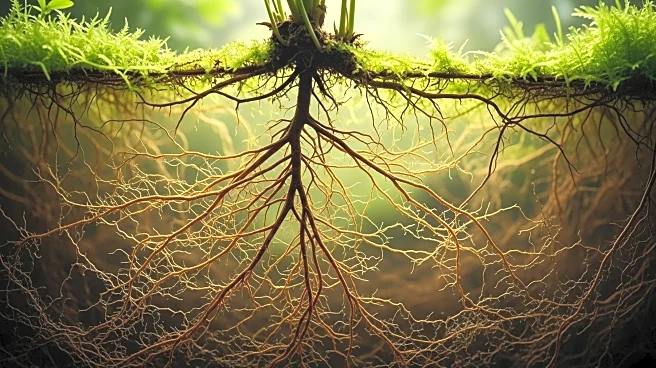What's Happening?
Toby Kiers, an evolutionary biologist, is conducting groundbreaking research into the symbiotic relationships between plants, fungi, and microbes. Her work focuses on understanding the evolutionary mechanisms that drive cooperation between species and the role of plant-microbe mutualisms in maintaining ecosystem health. Kiers has demonstrated that microbes are active participants in these relationships, rather than passive entities. Her research includes experiments showing how legumes punish noncooperative bacteria by withholding oxygen, thereby ensuring rhizobial cooperation. Kiers has also explored the resource trade between plants and mycorrhizal fungi, revealing a complex exchange system akin to a market economy. Her studies show that plants and fungi can reward or punish trading partners based on performance, maintaining stable resource exchanges. In 2021, Kiers co-founded the Society for the Protection of Underground Networks (SPUN), which aims to map and conserve Earth's underground fungal networks, highlighting their importance to planetary health.
Why It's Important?
Kiers' research is significant as it sheds light on the intricate relationships that sustain ecosystems, emphasizing the active role of microbes in these processes. Understanding these symbiotic partnerships is crucial for enhancing agricultural productivity and ecosystem resilience, especially in the face of climate change. The conservation efforts led by SPUN are vital for protecting fungal biodiversity, which plays a key role in carbon sequestration and soil health. By mapping underground fungal communities, Kiers and her collaborators are providing valuable insights into how human activities and environmental changes impact these networks. This research has the potential to inform public policy and conservation strategies, ensuring the preservation of essential ecological functions.
What's Next?
Through SPUN, Kiers continues to collaborate with researchers worldwide to map fungal networks and advocate for their conservation. The organization aims to raise awareness among the public and policymakers about the critical role fungi play in maintaining planetary health. Future research may focus on further understanding the impact of climate change on fungal biodiversity and exploring ways to enhance the resilience of these networks. As Kiers' work progresses, it could lead to new strategies for sustainable agriculture and ecosystem management, leveraging the natural symbiosis between plants and fungi.
Beyond the Headlines
Kiers' research touches on broader ethical and ecological considerations, such as the importance of preserving biodiversity and the interconnectedness of life forms. Her work challenges traditional views of microbes as mere accessories to plants, highlighting their agency and influence in ecological systems. The conservation of fungal networks not only supports environmental health but also raises questions about human responsibility in protecting these vital components of the biosphere. As awareness grows, there may be increased efforts to integrate fungal conservation into broader environmental policies.











